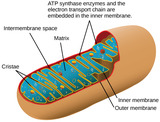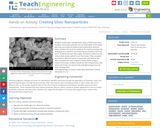
9 Results


Biology is designed for multi-semester biology courses for science majors. It is grounded on an evolutionary basis and includes exciting features that highlight careers in the biological sciences and everyday applications of the concepts at hand. To meet the needs of today’s instructors and students, some content has been strategically condensed while maintaining the overall scope and coverage of traditional texts for this course. Instructors can customize the book, adapting it to the approach that works best in their classroom. Biology also includes an innovative art program that incorporates critical thinking and clicker questions to help students understand—and apply—key concepts.
- Subject:
- Biology
- Life Science
- Material Type:
- Full Course
- Provider:
- Rice University
- Provider Set:
- OpenStax College
- Date Added:
- 08/22/2012

- Subject:
- Biology
- Life Science
- Material Type:
- Unit of Study
- Provider:
- Rice University
- Provider Set:
- OpenStax College

By the end of this section, you will be able to:Discuss the importance of electrons in the transfer of energy in living systemsExplain how ATP is used by the cell as an energy source
- Subject:
- Applied Science
- Biology
- Life Science
- Material Type:
- Module
- Author:
- Tina B. Jones
- Date Added:
- 08/16/2019

By the end of this section, you will be able to:Discuss the importance of electrons in the transfer of energy in living systemsExplain how ATP is used by the cell as an energy source
- Subject:
- Applied Science
- Biology
- Life Science
- Material Type:
- Module
- Date Added:
- 07/10/2017

- Subject:
- Applied Science
- Biology
- Life Science
- Material Type:
- Module
- Author:
- Tina B. Jones
- Date Added:
- 08/16/2019

- Subject:
- Applied Science
- Biology
- Life Science
- Material Type:
- Module
- Date Added:
- 07/10/2017

Students create silver nanoparticles using a chemical process; however, since these particles are not observable to the naked eye, they use empirical evidence and reasoning to discover them. Students first look for evidence of a chemical reaction by mixing various solutions and observing any reactions that may occur. Students discover that copper and tannic acids from tea reduce silver nitrate, which in turn form silver. They complete the reaction, allow the water to evaporate, and observe the silver nanoparticles they created in plastic dishes using a stereo microscope. Students iterate on their initial process and test to see if they can improve the manufacturing process of silver nanoparticles.
- Subject:
- Applied Science
- Chemistry
- Engineering
- Physical Science
- Material Type:
- Activity/Lab
- Provider:
- TeachEngineering
- Provider Set:
- Activities
- Author:
- Richard Daines
- Date Added:
- 02/08/2019

Got oxygen? Got food? Well, then you've got to have photosynthesis! This video will break down photosynthesis into the "photo" part (capturing light energy and storing it) and the "synthesis" part (fixing carbon into carbohydrates). It's all a bit complicated, but take a deep breath and let's find out where that oxygen comes from.
- Subject:
- Life Science
- Material Type:
- Lecture
- Provider:
- The Penguin Prof
- Author:
- The Penguin Prof
- Date Added:
- 12/20/2012